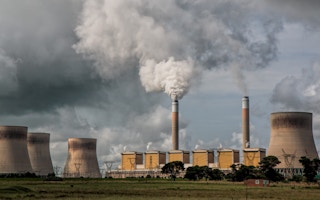When Japan submitted its new climate action plan on Monday, expectations ran high. The first wealthy nation to do so, Japan could have led the way on climate action, spurring other industrialised countries to follow suit.
To continue reading, subscribe to Eco‑Business.
There's something for everyone. We offer a range of subscription plans.
- Access our stories and receive our Insights Weekly newsletter with the free EB Member plan.
- Unlock unlimited access to our content and archive with EB Circle.
- Publish your content with EB Premium.
But it didn’t. Instead, the world’s fifth-largest emitter of climate-disrupting greenhouse gases announced that it would stick to its previous target to cut emissions by 26 per cent from 2013 levels—a commitment that has been rated as “highly insufficient” by research group Climate Action Tracker.
This year, all nations that inked the historic Paris climate deal in 2015 are expected to submit such updated and more ambitious commitments to reducing carbon emissions, or ‘nationally determined contributions’ (NDC), to achieve the key objective of the accord: keeping global warming to well below 2 degrees Celsius.
In the document submitted to the United Nations, the government said it would “pursue further efforts both in the medium-term and long-term, to reduce GHG emissions beyond this level”. But it fails to provide a timeline for doing so, although it states change would happen before the next round of enhanced climate commitments are due in five years’ time.
Laurance Tubiana, chief executive officer of the European Climate Foundation and one of the architects of the Paris agreement, said she welcomed Japan’s submission, but it was “disappointing” to see Japan had not increased its ambition in response to the climate crisis.
“At one of the most challenging times of recent memory, we need bolder, mutually reinforcing plans that protect our societies from the global risks we all face,” she said. Japan’s newly submitted climate targets come as countries around the world battle the coronavirus pandemic.
Japan’s lack of ambition isn’t just a blow to the climate fight. It puts Japanese people in danger of dirtier air, longer and more blistering heatwaves, and increasingly destructive typhoons. It is also at odds with bold corporate climate action at home.
Japan’s powerful banks, such as Mitsubishi UFJ Financial Group and Mizuho, have started to respond to continued pressure to quit coal. Only last week, Sumitomo Mitsui Banking Corporation announced it would suspend new loans for coal power. Marubeni, the biggest power developer in Japan, is moving away from the world’s dirtiest fossil fuel. Japan also just completed the world’s largest green hydrogen plant at Fukushima.
“It is unclear why Japan’s newly updated commitment under the Paris Agreement does not reflect the extraordinary [private sector] leadership underway at home with the highest possible ambition,” said Christiana Figueres, former head of the UN climate secretariat and convenor of the Mission 2020 campaign, which advocates for climate action.
Coal addiction
Nations around the globe have set tougher climate targets, or signalled their ambition to do so. The United Kingdom and most member states of the European Union aim to deliver net zero emissions by 2050. Similar plans have recently been announced by Japan’s coal-loving neighbour South Korea. The United States’ shift away from coal is accelerating.
Meanwhile, Japan is the only G7 country still building new coal-fired power plants—the largest source of man-made greenhouse gas emissions—with currently 11.9 gigawatts (GW) under development domestically. This would increase lifetime carbon emissions from its existing fleet by half.
Among members of the Organisation for Economic Cooperation and Development (OECD), a club of rich countries, Japan was among the biggest drivers of new coal power last year, contributing to the largest annual increase in global coal capacity since the Paris agreement.
As of 2018, renewables made up 17.4 per cent of Japan’s power mix, with coal and natural gas accounting for more than half of the electricity produced.
By 2030, Japan—one of the world’s most industrialised and technologically advanced nations—aims to increase the share of renewables to a mere 24 per cent. Even the Association of Southeast Asian Nations (Asean), which has been the slowest region in the world to adopt clean energy, plans to source 23 per cent of its power from renewables by 2025.
Beyond its borders, Japanese banks are financing 24.7 GW of coal power, larger than the entire coal fleet of Australia. In developing Asia, Japan is behind coal power stations so polluting they would fall short of the country’s own domestic emissions standards.
Such dirty investments don’t just undermine global efforts to combat climate change. They also pose financial risks, observed Tim Buckley, director of energy finance at the Institute for Energy Economics and Financial Analysis.
“With the number of proposed coal-fired power stations around the world drying up, Japan’s continued insistence on using public money to seek out a final wave of increasingly unviable coal power projects internationally to subsidise is both financially risky and counter-productive in the extreme,” he said.
“Fossil fuels have been the mainstay of the last century, but zero emissions technologies are the basis of industries of the future. Now is the time for Japan to show global leadership, to invest in developing renewable energy and energy efficiency technologies across Asia,” he said.

















